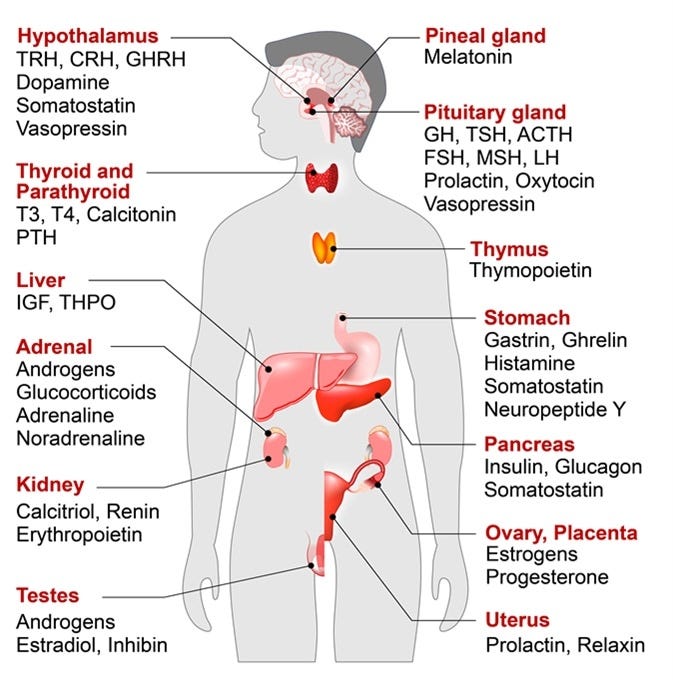What’s the Deal with My Hormones?
Last night I went to bed excited to get a solid seven hours of sleep. Then, every hour I found myself waking up. I even went to the bathroom in the middle of the night, which I usually don’t do, probably because I was very awake. This morning I woke up before my alarm went off but I was exhausted. I decided to get up and power through my day and then before I even looked in the mirror I could feel the little guys trying to pop out between my eyebrows.
And that’s when I started calculating… my interrupted sleep cycle, my new zits,the date— it’s almost time and my hormones are busy changing!
We hear a lot about hormones, and yet, I hear many people are stressed about it. So let’s break it down:
Where do hormones come from and what do they do?
Your body is the house of many systems, including the endocrine system, which is a group of eight endocrine glands in your body. (P.S. the ovaries are a gland!)
Endocrine literally means “secreting internally.” Normally, we would be appalled by the term “secreting” but we’re going to be forgiving because this is a crucial, and often neglected, part of our bodies.
To put it simply, your glands react to internal and external stimuli, and accordingly, secrete chemical messengers, AKA hormones. Some of our organs, such as our stomach, also release hormones.
Imagine hormones are messengers that are tagged with a destination by the gland. Once they’re in your bloodstream, they travel to their assigned destination (to cells or to organs, like your skin) and relay the message to control the action of the organ or cell.
This in turn drives and impacts bodily functions including:
- Growth and development
- Metabolism
- Sexual function
- Reproduction
- Mood
- Sleep cycle
- Heart rate
The glands release a lot of hormones, and different hormones reach different organs to alter functions, such as increase blood pressure, increase glucose production, suppress the digestive system, and more in a response commonly known as “fight or flight.
Be patient with your body, learn about your body, and gently test your body until you know what it needs.
Okay, so what hormones do I have?
Several types of hormones are working hard in our bodies, all with different objectives. It’s important to remember that we all have our own cocktail of these hormones, which makes each of us special.
Here are a few you may be familiar with:
- Adrenaline and cortisol are released in moments of threat or stress, increasing your heart rate, blood pressure, glucose level, and more, while suppressing non-essential functions such as digestive, reproductive, and growth, to help you respond efficiently
- Insulin regulates blood sugar levels and stores excess glucose for energy
- Growth hormone is just that — it stimulates growth
- Estrogen and progesterone are produced by your ovaries and are your main female sex hormones. Based on the stage of egg development, estrogen controls FSH and LH levels (think of it as a feedback loop) and thickens the lining of your uterus and prepares it for pregnancy. While progesterone, secreted by the corpus luteum (cells which form when an egg is released) prepares the uterus to accept implantation of the fertilized egg. Progesterone also has an important role during pregnancy.
- While testosterone is considered a “male” sex hormone, females also need some of this to team up with estrogen and grow your reproductive system

People who are Assigned Female At Birth (AFAB) have hormones that have specific functions and levels which vary based on the phases of your hormonal cycle or your current life stage — from birth to puberty/ menstruation to pregnancy to menopause, and beyond. Some of the hormones you should know include:
- Gonadotropin releasing hormone (GnRh) is released regularly from a part of your brain called the hypothalamus and its destination is an endocrine gland in your brain, the pituitary gland. GnRH is often deemed the most important hormone in reproduction because it stimulates the pituitary gland to produce follicle stimulating hormone (FSH) [see below]
- The pituitary gland secretes both Follicle-stimulating hormone (FSH) and Luteal hormone (LH), both destined for your ovaries. FSH leads to the start of egg development. LH stimulates eggs to mature and initiates the release of eggs from your ovary. (fun fact: your two ovaries take turns and trade off in releasing eggs each month)
- Anti-Müllerian hormone (AMH) has many different roles and after puberty, your ovaries create more AMH depending on how many eggs you have. Fertility tests often measure AMH
- Human chorionic gonadotropin (hGC) is produced by cells that will eventually become part of placenta. hGC is what pregnancy tests test for!
- Prolactin is released to tell your body to make breast milk
What impacts hormones?
Yes, your environment can have an impact on your hormones, so it’s important to note when what you feel is having a positive, negative, or neutral effect on your body and mind. Journaling is great for this!
Some of the major impacts on your hormonal system are stress, diet, and exercise. It’s personal though, so we can’t generalize how these impact you individually. Plus, you can control some things and you can’t control others.
So how does my hormonal cycle actually work?

Source: Women’s Health Queensland
A picture is worth a thousand words.
This is an illustration with 28 days. Everyone is different and your cycle may be shorter or longer.
This brief rundown on hormones is from my understanding over the years and personal research, and in no way should be taken as medical advice! Please consult a doctor for medical advice.
